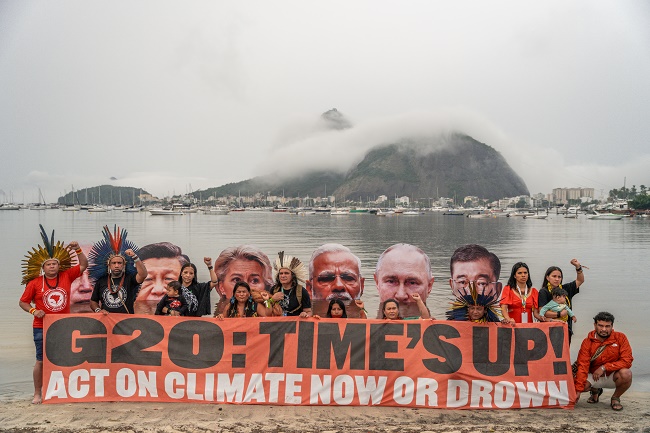With a symbolic protest, the Articulation of Indigenous Peoples of Brazil (APIB) held a peaceful demonstration in Rio de Janeiro on Saturday, November 16, 2024, to denounce the inaction of the world’s wealthiest and most polluting nations in addressing the global climate crisis. Images of leaders from rich and polluting countries – China, the United States, India, the European Union, Russia, and Japan – were placed in the water before the iconic Sugarloaf Mountain to emphasise that the climate crisis is also a crisis of leadership and values.

The action occurred two days before the G20 summit, a gathering of the world’s largest economies, which will be held in the same city. It marks the launch of Indigenous mobilisation toward the 30th session of the Conference of the Parties (COP30) to United Nations Framework Convention on Climate Change (UNFCCC), which will take place in Brazil next year. The group demands that the demarcation of Indigenous lands be recognised as climate policy and an effective solution to the climate crisis, and they assert their right to an active, leading role in global decisions affecting the planet’s future.
“Strong and effective action must be taken with the imminent collapse of living conditions worldwide. There will be no preservation of life on a planet in flames,” declares the statement issued by the Brazilian Indigenous movement on Saturday. “We have never ceased to defend life, and we will not be lost in empty discussions and hollow commitments. While governments continue to negotiate inadequate targets and insufficient funding, we want to announce that from now on, we will take the lead in a global mobilisation for life on the planet.”
The campaign, “We Are the Answer,” demands a genuine commitment to the planet’s future, emphasising the need for immediate action and the central role of Indigenous peoples in fighting the environmental crisis.
With the February deadline for submitting updated Nationally Determined Contributions (NDCs) fast approaching, the action, with support partners 350.org and ClimaInfo emphasised that the responsibility to act decisively falls on the nations contributing most to the climate emergency. As the host nation of COP30, Brazil has a unique opportunity to set the tone for global ambition. Still, it will take collective action from the G20 to drive the transformative change needed to address the escalating climate crisis.
With G20 countries accounting for more than 80% of global wealth and approximately 80% of greenhouse gas emissions, the pressure for real solutions has never been more significant.
A study by the Independent High-Level Expert Group on Climate Finance, affiliated with the UN, indicates that developing countries (excluding China) will need annual investments of $2.4 trillion by 2030 to tackle the climate crisis. These funds would go towards nature conservation, transitioning to renewable energy, and adapting to climate change.
Nevertheless, the recent failure at the Biodiversity COP in October and the $7 trillion in subsidies provided to oil companies in 2022 reveal the low global commitment to climate and biodiversity financing.
“It is urgent to correct this policy that puts the profits of big corporations above the protection of communities. The richest nations must take responsibility and fund climate solutions for those who, like Indigenous peoples, are on the front lines of the crisis,” says Dinaman Tuxá, executive coordinator of APIB.
At COP26 in 2021, countries like the United Kingdom, the United States, Germany, Norway, and the Netherlands promised $1.7 billion to support Indigenous peoples. However, only 7% of that amount has been directly allocated to Indigenous organisations without intermediaries.
“The money exists, but it is not going where it should—enough of passing the problem onto the next generation. We need political courage, especially from the wealthiest nations, to end the use of fossil fuels once and for all, accelerate a fair transition, and fund those who have done the most to address the climate crisis. We are the true climate authorities,” concludes Kleber Karipuna, executive coordinator of APIB.
